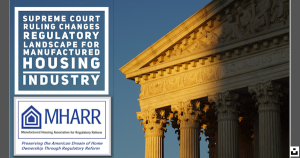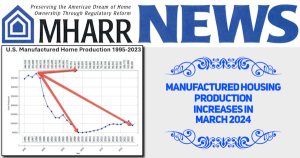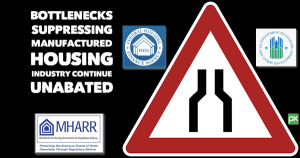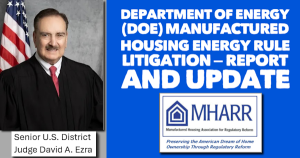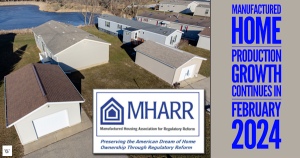Department of Energy (DOE) Publishes ‘Unacceptable’ Manufactured Housing Energy Rule Extension
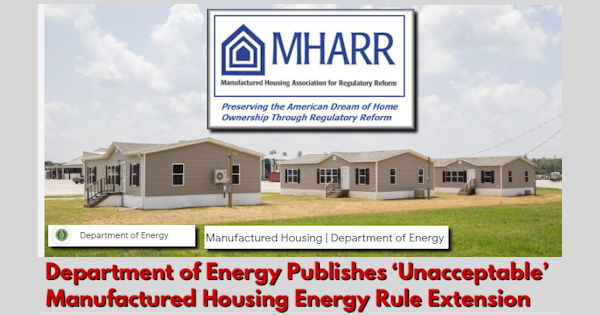
DOE PUBLISHES UNACCEPTABLE ENERGY RULE EXTENSION
The U.S. Department of Energy (DOE) has published a final rule in the May 30, 2023 edition of the Federal Register to extend the date for compliance with the manufactured housing “energy conservation” standards adopted on May 31, 2022. Under the final rule, manufacturers of single-section “Tier 1” homes will have until sixty (60) days after publication of the final DOE enforcement regulations to begin compliance with the new standards, while manufacturers of multi-section “Tier 2” homes will have until July 1, 2025 to comply.
While MHARR supported an extension of the compliance date for the new standards, based on DOE’s failure to propose – and consider the cost-impact of – regulatory compliance, testing and enforcement procedures at the time it developed and initially published its May 31, 2022 standards, MHARR has consistently opposed the DOE standards themselves as a baseless attack on the affordability and availability of HUD Code manufactured homes in violation of the National Manufactured Housing Construction and Safety Standards Act of 1974 (as amended). Thus, MHARR in its compliance extension comments, called once again on DOE to not only delay, but to totally withdraw its May 31, 2022 standards and to “go back to the drawing board” to develop new, appropriate and cost-justified standards in full accordance with both the Energy Independence and Security Act of 2007 and federal manufactured housing law.
What has emerged, however, in the wake of the final extension rule, is a set of unnecessary, excessive, market-killing energy standards, paired with a compliance scheme that already baselessly targets and discriminates against the industry’s most affordable single-section homes. Put simply, if multi-section “Tier 2” homes warrant a two-year compliance phase-in period, single-section “Tier 1” homes should, at a minimum, be treated in the same manner and not subject to a shorter, discriminatory phase-in period that will further distort a market that has been crippled by higher interest rates, higher supply costs and plummeting production over two consecutive quarters. Better yet, DOE’s entire May 31, 2022 standards rule should be jettisoned and replaced by a valid and legitimate rule, based on a valid and legitimate process, rather than a process that remains – and continues to be – infected by DOE’s corrupted 2014-2015 “negotiated rulemaking.”
As DOE’s standards and compliance processes currently stand, however, moderate and lower-income American consumers who rely on the industry’s most affordable homes, will be targeted with additional excessive and unnecessary costs first. Until the courts decide the fate of the inappropriate and excessive May 31, 2022 DOE standards, DOE should at a minimum treat all types of manufactured housing – and consumers – the same.
Rather than a mere delay, the entire DOE energy standards debacle deserves to be “killed,” as the Wall Street Journal declared in a May 9, 2023 editorial (please see copy attached). MHARR will continue to aggressively pursue that end, as it has consistently for years.
cc: Other Interested HUD Code Manufactured Housing Industry Members

DOE PUBLISHES UNACCEPTABLE ENERGY RULE EXTENSION
The U.S. Department of Energy (DOE) has published a final rule in the May 30, 2023 edition of the Federal Register to extend the date for compliance with the manufactured housing “energy conservation” standards adopted on May 31, 2022. Under the final rule, manufacturers of single-section “Tier 1” homes will have until sixty (60) days after publication of the final DOE enforcement regulations to begin compliance with the new standards, while manufacturers of multi-section “Tier 2” homes will have until July 1, 2025 to comply.
While MHARR supported an extension of the compliance date for the new standards, based on DOE’s failure to propose – and consider the cost-impact of – regulatory compliance, testing and enforcement procedures at the time it developed and initially published its May 31, 2022 standards, MHARR has consistently opposed the DOE standards themselves as a baseless attack on the affordability and availability of HUD Code manufactured homes in violation of the National Manufactured Housing Construction and Safety Standards Act of 1974 (as amended). Thus, MHARR in its compliance extension comments, called once again on DOE to not only delay, but to totally withdraw its May 31, 2022 standards and to “go back to the drawing board” to develop new, appropriate and cost-justified standards in full accordance with both the Energy Independence and Security Act of 2007 and federal manufactured housing law.
What has emerged, however, in the wake of the final extension rule, is a set of unnecessary, excessive, market-killing energy standards, paired with a compliance scheme that already baselessly targets and discriminates against the industry’s most affordable single-section homes. Put simply, if multi-section “Tier 2” homes warrant a two-year compliance phase-in period, single-section “Tier 1” homes should, at a minimum, be treated in the same manner and not subject to a shorter, discriminatory phase-in period that will further distort a market that has been crippled by higher interest rates, higher supply costs and plummeting production over two consecutive quarters. Better yet, DOE’s entire May 31, 2022 standards rule should be jettisoned and replaced by a valid and legitimate rule, based on a valid and legitimate process, rather than a process that remains – and continues to be – infected by DOE’s corrupted 2014-2015 “negotiated rulemaking.”
As DOE’s standards and compliance processes currently stand, however, moderate and lower-income American consumers who rely on the industry’s most affordable homes, will be targeted with additional excessive and unnecessary costs first. Until the courts decide the fate of the inappropriate and excessive May 31, 2022 DOE standards, DOE should at a minimum treat all types of manufactured housing – and consumers – the same.
Rather than a mere delay, the entire DOE energy standards debacle deserves to be “killed,” as the Wall Street Journal declared in a May 9, 2023 editorial (please see copy attached). MHARR will continue to aggressively pursue that end, as it has consistently for years.
cc: Other Interested HUD Code Manufactured Housing Industry Members




